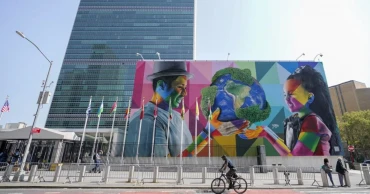Bangladesh Myanmar Border Tension
Myanmar’s shelling inside Bangladesh “unintentional mistake”, Momen says in NY
Foreign Minister AK Abdul Momen on Tuesday termed Myanmar’s recent mortar shelling inside Bangladesh “unintentional mistake”.
He said this while addressing a press conference — on Prime Minister Sheikh Hasina’s itinerary at the 77th UNGA — at Hotel Lotte in New York.
The foreign minister said Myanmar authorities informed them that they are not shelling, targeting Bangladesh.
Read Myanmar claims mortar shells fired by Arakan Army, ARSA on its border forces landed in Bangladesh
“That particular border area is very crisscrossed. Sometimes it is difficult to understand the border…for that reason, they are not shelling inside our border intentionally,” Momen said. One or two mortar shells that landed inside the Bangladesh border were dropped by mistake, he said.
He also said that Bangladesh foreign ministry summoned the Myanmar ambassador and the Myanmar authority promised that they will remain cautious.
Momen said Bangladesh has sealed the entire border and will not allow any more Rohingyas cross into the country.
Read Malaysian foreign minister, int’l lawmakers demand decisive action on Myanmar
He also mentioned that some Rohingyas went to the China area as they did not dare to come to the Bangladesh side.
He hoped that the displaced Rohingyas, who are staying in Bangladesh, would return to their homeland.
The foreign minister said Prime Minister Sheikh Hasina has reiterated her call to the international community and the United Nations to play a more active role in repatriation of the forcibly displaced Rohingyas to their motherland Myanmar.
Read Tension at Bangladesh-Myanmar border: Govt plans to evacuate 300 families
She made the call while UN High Commissioner for Refugees Filippo Grandi paid a courtesy call on her in New York.
Sheikh Hasina also emphasized enhancing UNHCR's activities in Myanmar for solving the Rohingya issue.
In response, Filippo Grandi said he would visit Myanmar soon.
Read BGB, Coast Guard asked to remain alert with “reinforcement”, if needed
The PM reiterated that the Rohingya crisis can only be resolved by repatriating them to Myanmar.
The UNHCR High Commissioner also agreed with her on this matter.
During the meeting, they discussed in detail the present operations of UNHCR to help Rohingyas who took shelter in Cox's Bazar and Bhashanchar in Bangladesh.
Read BNP urges global community to act against Myanmar's insolent activities
Later, Prosecutor of the International Criminal Court (ICC) Karim A A Khan QC also called on Prime Minister Sheikh Hasina.
They discussed various aspects of cooperation between Bangladesh and the ICC.
The Premier has assured the ICC Prosecutor that Bangladesh will continue to cooperate with all ongoing efforts at the ICC to ensure justice and accountability for the Rohingya victims of torture in Myanmar.
Read Do more to cut Myanmar military's revenue, arms supply: UN to countries
ICC Prosecutor Karim Khan has expressed interest in visiting Bangladesh again early next year.
Executive Director of the UN-Habitat Maimunah Mohd Sharif paid a courtesy call on the Prime Minister Sheikh Hasina as well.
In this meeting, the steps for sustainable urbanisation taken by the Bangladesh government and areas of future cooperation were discussed.
Read Bangladesh-Myanmar border tension: ASEAN envoys to relay Dhaka's concerns
In this connection, the Prime Minister informed him about the success of the Ashrayan Project undertaken by the Government of Bangladesh for the landless and homeless people.
3 years ago
Myanmar claims mortar shells fired by Arakan Army, ARSA on its border forces landed in Bangladesh
Myanmar has claimed that the Arakan Army and terrorist group ARSA used the same weapons and attacked the Taungpyo (Right) Border Guard Police Outpost at BP-34 on September 16 and 17, 2022 when nine mortar shells landed on Bangladeshi soil.
Zaw Phyo Win, Director-General of Strategic Studies and Training Department of the Ministry of Foreign Affairs, Myanmar met Manjurul Karim Khan Chowdhury, Ambassador of Bangladesh to Myanmar, at the Ministry of Foreign Affairs in Yangon on Monday.
The director-general claimed that Arakan Army and terrorist group ARSA have been deliberately carrying out such attacks to cause “negative consequences” on the existing “cordial bilateral relations” between Bangladesh and Myanmar, according to the Myanmar Ministry of Foreign Affairs.
Also read: MOFA lodges strong protest over Myanmar’s mortar shells into Bangladesh
He said Myanmar will cooperate with Bangladesh to maintain peace in the border areas and stressed the significance of full and reciprocal cooperation from the Bangladesh side.
The director-general stated that while taking the necessary security measures close to the border with utmost caution, the Myanmar side always abides by bilateral agreements and international norms as well as respects the integrity and sovereignty of all nations, including Bangladesh.
He recalled that on September 7, 2022, the Bangladeshi side was notified of the information of the trenches and bases of the AA and ARSA terrorists located “inside Bangladesh” through diplomatic channel and reiterated Myanmar’s call to take necessary and immediate actions to investigate on the ground and dismantle those structures and bases.
Also read: Unexploded mortar shells found near Bangladesh-Myanmar border
Later, he handed over a non-paper containing the Myanmar version of the incidents to the Bangladesh ambassador.
During the meeting, the director-general clarified the prevailing on-the-ground situations regarding the firing incidents near Myanmar-Bangladesh border in response to issues raised by the Bangladesh side at the meetings between Myanmar ambassador to Bangladesh and director-general of the Ministry of Foreign Affairs of Bangladesh.
The director-general apprised that AA and terrorist group ARSA attacked the Taungpyo (Left) Border Guard Police Outpost at BP-31 with mortars on September 16, 2022 when three mortar shells landed inside Bangladesh territory.
Read Malaysian foreign minister, int’l lawmakers demand decisive action on Myanmar
3 years ago
Malaysian foreign minister, int’l lawmakers demand decisive action on Myanmar
Malaysian Foreign Minister Saifuddin Abdullah, parliamentarians from Europe and Asia, and members of the National Unity Government (NUG) of Myanmar have urged the global community to take stronger action to tackle the crisis triggered in Myanmar following last year’s coup d’état.
Minister Abdullah hosted a meeting on September 19 (NY Time) focused on Myanmar at the Malaysian Permanent Mission to the United Nations in New York, on the sidelines of the UN General Assembly, which is taking place this week.
“There should be an inclusive and fair consultation with all stakeholders in Myanmar, including the NUG and NUCC. Then there should be a framework with a clear endgame, which includes a return to democracy in Myanmar,” Abdullah said.
Also read: Bangladesh-Myanmar border tension: ASEAN envoys to relay Dhaka's concerns
Abdullah is the only ASEAN minister who has publicly met with members of the NUG, the legitimate government in Myanmar, which represents the democratic aspirations of the country’s people.
The meeting was attended by NUG Minister for Human Rights, Aung Myo Min; NUG Minister of Communications, Information and Technology, as well as its spokesperson, Htin Linn Aung; permanent representative of Myanmar to the UN, Kyaw Moe Tun; as well as representatives of other Myanmar pro-democracy organizations, according to a media release received from New York on Tuesday.
“The Myanmar people deserve to have their true representatives at the table where regional decisions are being made,” said Htin Linn Aung.
Also read: Tension at Bangladesh-Myanmar border: Govt plans to evacuate 300 families
The meeting was attended by Heidi Hautala, Vice President of the European Parliament and Chair of the International Parliamentary Inquiry (IPI) into the global response to the crisis in Myanmar; Charles Santiago, Malaysian MP and Chairman of ASEAN Parliamentarians for Human Rights; Mercy Chriesty Barends, member of the Indonesian House of Representatives; and Tom Villarin, former congressman from the Philippines.
Since the coup d’état on February 1, 2021, Myanmar has been plunged into a deep crisis, as the military junta led by Senior General Min Aung Hlaing has engaged in an all-out war against its population in order to cement its power.
A massive civil disobedience movement has demonstrated that the vast majority of the country’s population do not wish to live under military rule and has valiantly resisted the power grab.
Read BGB, Coast Guard asked to remain alert with “reinforcement”, if needed
Meanwhile, international attention has largely shifted to crises elsewhere.
“Nineteen months after the coup, the international allies of the junta have shown a commitment to supporting Min Aung Hlaing which surpasses that of those countries claiming to support the pro-democracy movement,” said Charles Santiago.
“Simply put, the latter are not doing enough to help the Myanmar people, as countries like Russia or China actively support the military, engage the junta and give it the recognition it so keenly craves,” he added. “It is high time for those governments that claim to support democracy in Myanmar to act forcefully.”
Read BNP urges global community to act against Myanmar's insolent activities
In order to assess the global response to the crisis in Myanmar and offer recommendations on what international actors should do to support democracy and human rights in the country, APHR launched the International Parliamentary Inquiry on Myanmar in June.
Chaired by Heidi Hautala, Vice President of the European Parliament, the IPI Committee is formed by eight parliamentarians from seven countries in Africa, the Americas, Asia, and Europe.
The IPI has held a total of six public oral hearings, as well as two special and three confidential oral hearings, with experts, diplomats, politicians, and activists from Myanmar and other countries.
Read Do more to cut Myanmar military's revenue, arms supply: UN to countries
IPI committee members also conducted a fact-finding mission to the Thai-Myanmar border in August, where they met with over a dozen civil society organizations and other stakeholders.
On the occasion of the UN General Assembly, the IPI has sent a delegation to New York and Washington, in order to present its preliminary findings.
The IPI final report will be released in November.
The IPI members are presenting a position paper to a variety a stakeholders in New York and Washington, in which they assert that the coup has failed in the face of widespread popular opposition.
Read UN experts seek more help for human rights defenders in push for accountability in Myanmar
Myanmar has been plunged into a civil war between the military and the pro-democracy movement, which is bound to be long and protracted.
“As the conflict in Myanmar remains undecided, and the coup is triggering a humanitarian crisis of an enormous scale, what international actors do, or fail to do, may tip the scale in favor of military dictatorship or democracy," said Heidi Hautala.
"We urge the global community to scale up humanitarian aid, to increase the pressure on the junta through improved coordination on sanctions and diplomatic isolation. We further urge international actors to fully acknowledge the NUG as what it is, the legitimate government of Myanmar, and support it accordingly with funding, capacity building initiatives, and diplomatic recognition,” Heidi Hautala added.
Read Bangladesh wants discussion to avert border tension with Myanmar: Foreign Secretary
3 years ago





